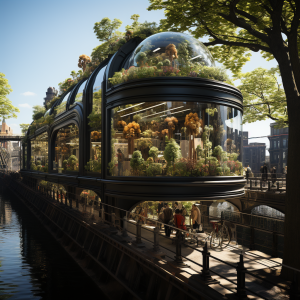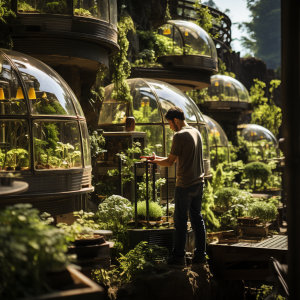Bio-Enhanced Nootropic Gardens for Urban Intellectual Flourishing
Thought
Contemplating on how to merge the benefits of green spaces with cognitive enhancement in urban environments.

Note
Imagine a garden where the plants are engineered to enhance cognitive functions.
Analysis
A notable thought emerged while reflecting on the synergies between urban landscapes, wellness, and our pursuit of intellectual betterment. Green spaces are documented for their psychological and physiological benefits, thus the idea of a Bio-Enhanced Nootropic Garden combines urban greenery with synthetic biology to promote cognitive enhancement naturally.

This concept assumes that the integration of specific plants, which have nootropic effects, can be designed or bio-engineered to thrive in urban environments thus yielding a multi-purpose green space. These nootropic gardens would serve not only as tranquil urban oases but also as sources of natural cognitive enhancers that could be beneficial for city inhabitants.
Exploring Arthur Koestler's concept of bisociation, this idea brings together two unrelated matrices of thought—the design of urban green spaces (normally associated with leisure and ecological benefits) and the use of nootropics for cognitive enhancement (which is generally achieved through pharmaceuticals or supplements). By crossing these elements, a Bio-Enhanced Nootropic Garden would redefine public spaces' function by considering them as assets for mental performance.
While traditional utilitarian views of plants in urban settings revolve around aesthetics or air quality improvements, this notion expands their value proposition to include boosting brain health and function through the measured diffusion of nootropic substances—either airborne or through consumption of plant parts (if safe and legally permissible).
This reflection necessitates familiarity with various sources to ground the feasibility of such a project:
Books
- "The Hidden Life of Trees" by Peter Wohlleben - Offers insights on the complex life of plants.
- "Your Brain on Nature" by Eva M. Selhub and Alan C. Logan - Discusses the positive effects of nature on the brain.
- “Neuro-Linguistic Programming: Volume 1” by Robert Dilts et al. - Provides understanding on how one's environment can influence cognitive states.
Papers
- "Plant Nootropics: The Enhancement of Human Brain Function with Plants and Phytochemicals” by Fernando Gomez-Pinilla and Trang-Tiffany Nguyen - Spotlights the cognitive benefits of plant-derived substances.
Existing Products
- Various nootropic supplements already in the market, but the uniqueness here would be the source being a live garden.
Tools
- CRISPR-Cas9 for precision editing of plant genes to improve survival in urban conditions and enhance their nootropic properties.
- Urban Planning Software to design and integrate these gardens into cityscapes.
Services
- Guided tours and educational programs about the cognitive effects of the plants within the gardens.
- Wellness and meditation sessions in the nootropic gardens to maximize the cognitive benefits received.
This idea simultaneously contributes to urban well-being and the search for cognitive optimization, addressing societal desires for self-improvement and the intrinsic need for connection to nature despite the constraints of urban living. It also poses ecological and ethical considerations that would need thorough examination, including the safety and long-term effects of such an environment, as well as protecting natural biodiversity against the unintended consequences of bioengineering.